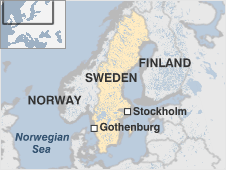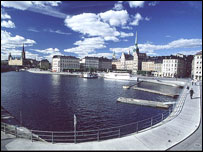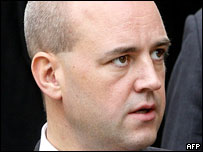 |
Sweden's position as one of the world's most highly developed post-industrial societies looks fundamentally secure.
Unemployment is low and the economy strong. Public-private partnership
is at the core of "the Swedish model" which was developed by the Social Democrats who governed for most of the last 70 years until 2006.
Overview
This mixed economy traditionally featured centralised wage negotiations and a heavily tax-subsidised social security network. The Swedes still enjoy an advanced welfare system and their standard of living and life expectancy are almost second to none.

Stockholm: The capital's old town is well-preserved
|
The country is also a common destination for refugees and asylum seekers - immigrants make up more than 10% of its population.
Swedes voted in a referendum in 1980 to phase out nuclear power and the country began to decommission reactors in 1999. However fears over climate change and energy security persuaded the government to reverse the decision in 2009 and plans are on the table to replace the country's 10 remaining reactors.
Sweden is known throughout the world for its neutrality. This policy has led to a number of Swedish politicians taking on international roles often mediating between conflicting groups or ideologies. With the ending of the Cold War Sweden felt able to join the European Union in 1995 although it still declines to become a Nato member.
Sweden was one of three EU countries not to join the single European currency. In the first referendum on membership after the euro's introduction in 12 of 15 EU countries Swedish voters rejected it by a clear majority in September 2003.
Facts
- Full name: Kingdom of Sweden
- Population: 9.2 million (UN 2009)
- Capital: Stockholm
- Area: 449964 sq km (173732 sq miles)
- Major language: Swedish
- Major religion: Christianity
- Life expectancy: 79 years (men) 83 years (women) (UN)
- Monetary unit: 1 Swedish krona = 100 ore
- Main exports: Machinery and transport equipment paper products chemicals
- GNI per capita: US $50940 (World Bank 2008)
- Internet domain: .se
- International dialling code: +46
Leaders
King: Carl XVI Gustaf
Prime minister: Fredrik Reinfeldt
The Alliance for Sweden a centre-right coalition headed by Moderate Party leader Fredrik Reinfeldt unseated the Social Democrat Party of Goran Persson in elections in September 2006.
 Fredrik Reinfeldt's win ended a decade of Social Democrat rule
|
Mr Persson was one of Europe's longest-serving leaders having spent 10 years in the job. The Social Democrats governed Sweden for much of the period since World War II.
The Alliance for Sweden has a slim seven-seat majority in the 349-seat parliament. It campaigned on a platform of streamlining the welfare state and cutting taxes in order to create jobs.
Since becoming party leader in 2003 Mr Reinfeldt has moved the Moderates towards the political centre. He forged a four-party alliance with the Christian Democrats the Liberals and the Centre Party. He supports Sweden's entry into Nato provided there is cross-party support.
Born in 1965 Fredrik Reinfeldt joined his party's youth wing in 1991. He is married and has three children.
Media
Swedish audiences enjoy a wide variety of public and commercial broadcast services though until relatively recently public TV and radio funded by a licence fee had a near-monopoly of the airwaves.
Public television is run by Sveriges Television (SVT). Its main competitor is TV4 a commercial station which launched in 1992. The country is home to the regional media giants Bonnier and the Modern Times Group (MTG).
Most households have cable or satellite TV and can choose from among dozens of channels. Digital terrestrial broadcasting was launched by SVT in 1999; pay-TV channels are also broadcast in the format. The analogue TV signal was switched off in late 2007.
Public radio is run by Sveriges Radio. Commercial radio began in 1993 and there are nearly 100 stations. Some of them have consolidated into near-national networks.
Most Swedish households take a daily newspaper and the country is among the top consumers of newspapers in the world. Many titles have a regional readership. The government subsidises newspapers regardless of their political affiliation.
The press
- Aftonbladet - Stockholm-based daily
- Dagens Nyheter - Stockholm-based daily
- Expressen - Stockholm-based daily
- Svenska Dagbladet - Stockholm-based daily
- Goteborgs Posten - Gothenburg-based daily
- Sydsvenska Dagbladet - Malmo-based daily
- The Local - English-language online news
- The Scandinavian Insider - English-language business and lifestyle
Television
- Sveriges Television (SVT) - public operates terrestrial networks SVT 1 and SVT 2 news channel SVT24 European satellite channel SVT Europa
- TV4 - commercial terrestrial
- TV3 - commercial via satellite and cable
- Kanal 5 - commercial via satellite and cable
- ZTV - commercial via satellite and cable
Radio
- Sveriges Radio - public operates news and public affairs station P1 classical music station P2 youth station P3 and regionally-based news and music station P4
- Radio Sweden International - external service run by Sveriges Radio broadcasts in a number of languages including English
- Rix FM - commercial national pop music network
- NRJ - commercial national pop music network
- Mix Megapol - commercial national music network
News agency
-
TT - owned by several media groups
AFRICA | ASIA-PACIFIC | AMERICAS | EUROPE | MIDDLEEAST | SOUTHASIA
Mauritania Mauritius Morocco Mozambique Namibia Niger Nigeria Republic-of-congo Rwanda Sao-tome-and-principe Senegal Seychelles Sierra-leone Somalia South-africa Sudan Swaziland Tanzania The-gambia Togo Tunisia Uganda zambia Zimbabwe Australia Brunei Burma Cambodia China East-timor Fiji Indonesia Japan Kazakhstan Kiribati Kyrgyzstan Laos Malaysia Marshall-islands Micronesia Mongolia Nauru New-zealand North-korea Palau Papua-new-guinea Samoa Singapore Solomon-islands South-korea Taiwan Tajikistan Thailand The-philippines Tonga Turkmenistan Tuvalu Uzbekistan Vanuatu Vietnam Antigua-and-barbuda Argentina Bahamas Barbados Belize Bolivia Brazil Canada Chile Colombia Costa-rica Cuba Dominica Dominican-republic Ecuador El-salvador Grenada Guatemala GuyanaHaiti Honduras Jamaica Mexico Nicaragua Panama Paraguay Peru St-kitts-and-nevis St-lucia St-vincent-and-the-grenadines Suriname Trinidad-and-tobago United-states-of-america Uruguay Venezuela Albania Andorra Armenia Austria Azerbaijan Belarus Belgium Bosnia-hercegovina Bulgaria Croatia Cyprus Czech-republic Denmark Estonia Finland France Georgia Germany Greece Hungary Iceland Ireland Italy Latvia Liechtenstein Lithuania Luxembourg Macedonia Malta Moldova Monaco Montenegro Norway Poland Portugal Russia San-marino Serbia Slovakia Slovenia Spain Sweden Switzerland The-netherlands Turkey Ukraine United-kingdom Vatican Algeria Egypt Iran Iraq Israel-and-palestinian-territories Jordan Kuwait Lebanon Libya Mauritania Oman Saudi-arabia Sudan Syria Tunisia United-arab-emirates Yemen Afghanistan Bangladesh Bhutan India Nepal Pakistan Sri-Lanka The-Maldives

